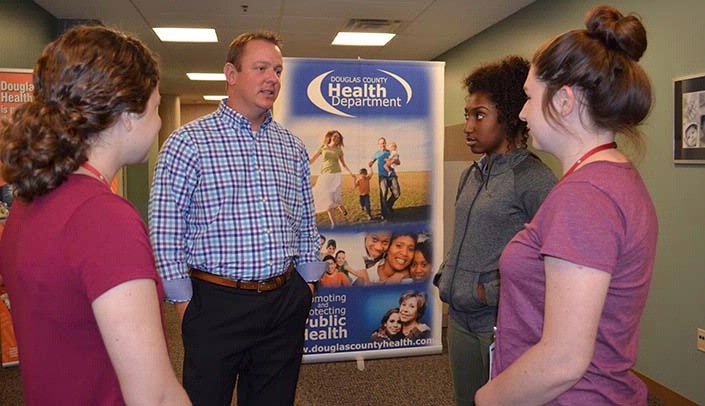Justin Frederick is passionate about public health, and he wants everyone to know it.
That’s one of the reasons he invited 14 students from the Summer Health Professions Education Program (SHPEP) and the Summer Undergraduate Research Program (SURP) to spend an afternoon earlier this month at his workplace — the Douglas County Health Department (DCHD) — to learn the practical side of the field.
Frederick, the supervisor of communicable disease epidemiology, asked his colleagues to give 20-minute presentations on what they do to protect residents from, respond to and develop policy for a wide variety of public health issues.
“Public health is always evolving. That’s what so great about it,” Frederick said. “My job is not predictable.
“Who knew that one day I’d monitor individuals who were potentially exposed to Ebola along with all the health care workers who attended the Ebola patients here in Omaha? Or that I’d be involved in a 2010 national seed stock recall of alfalfa sprouts that were contaminated with salmonella? Or that I needed to be an overnight expert on Zika virus?”
Frederick “kind of fell into this job” in 2003 when he was hired on as a temporary worker. He fell in love with public health and the job became a career. In 2011, he received his master’s degree in public administration from UNMC’s College of Public Health and has been an advocate for the college ever since.
“I’m a lifelong learner and I encourage everyone to pursue more education,” he said.
In 2015, he completed UNMC’s Public Health Leadership Institute. Since then, Frederick has served on the college’s Engagement Council, just finishing two years as president. Now, he’s on the UNMC Alumni Association Board of Directors.
“The college has brought so much attention to public health in Nebraska – it has helped us build a more advanced workforce and it expands opportunities,” he said.
Frederick’s associations with the college has opened the door to additional opportunities. He now serves as a site visitor for the national accrediting organization for schools of public health and has participated in a job task analysis to ensure the national public health certification reflects professional relevance.
The students, who were already interested in public health, mostly asked about qualifications needed for health department positions.
“You can come from practically any educational background,” Frederick said, “and you can find a way to relate it to public health.”
